2000: the year in which Silverchair said they’d make it up to us. Did they ever get around to it? I’m not sure. Whatever am I talking about? Never mind, we’re into part 5 of our history of PC Zone magazine, so let’s get on with that.
Part 5: 2000-2001 – Reality Check
At some point in this period, Zone seemed to lose its cheeky sixth-form humour. It wasn’t entirely down to the departure of Charlie Brooker, but his moving on did seem to leave the team short of something that the old Zone always had. One of Brooker’s last pieces was a final-page comment about being crap at Quake III that included the line: “you’d be surprised how easy it is to fool a desperate male virgin in a dark room, using cunning determination, a high voice and a very convincing wig.” It was an appropriate note on which to depart.
In general, Comment, which replaced Sick Notes, was comparatively po-faced and unmemorable compared with what had come before. A rotating line-up of writers took it in turns to sound off about serious subjects, or to try and be funny, with mixed results. There was one exception, when the page managed to deal with Serious Topics with some success, in which freelancer Mike Anderiesz addressed the tabloid response to September 11th and the media’s attempts to link the attacks, somehow, to video games.
It was apparently a matter of hours after the attack before his phone started ringing: “By rumour and conjecture, they had found their culprit. It was none other than Microsoft Flight Simulator. Despite being criticised for years for not featuring aerial combat, MS Flight Sim still featured scale 3D models of Manhattan, it featured Boeing 757s, and yes, you could crash one into the World Trade Center if you so desired. Even worse, the level of detail was so good, it was possible to accurately track the flight path from Washington to NYC to do it. Now would I write the piece (they wanted to know) and, if possible, could I also take some screenshots of the plane hitting the building? No, I replied.”
For a brief period we also had Team Talk, which was very much in the mould of Looking Back – a round-up of what the team had been up to that month, and a short-lived replacement for Mr Cursor in the mid-late 90s. As we mentioned previously, a write-up of the office ‘banter’ does, in principle, sound awful, but it was actually quite entertaining, particularly the tales of Zone’s participation in the Dennis Publishing five-a-side football tournament, or the team’s addiction to a particularly dangerous wheat beer known colloquially as ‘Wheatos’.
Daikatana was – finally – reviewed in PC Zone, accompanied by perhaps one of the most dishonest cover teasers ever: “Better than Half-Life?” asked the cover of Zone 91. You should really only put that on the cover if there’s any chance of the answer to that question being “Yes”. Anyway, it certainly worked on me – having expected Daikatana to be nothing more than a complete turkey, I excitedly snapped up the issue, only to have those thoughts confirmed in the review itself (it began with the words “Oh dear, oh dear, oh dear…” and ended with a score of 53%).
Although I did enjoy Dave Woods expanding on the review later in the magazine: “As a professional games reviewer I can’t just look at a game for ten minutes, say it’s a bit shit, then launch into Quake III. Despite the fact that I know it’s not going to get any better, or even improve enough to make the experience even slightly enjoyable, I’ve got to play it all the way through. And then go into multiplayer mode for a couple of days. And then kill myself. Which I nearly did after experiencing the thrills of Daikatana‘s pit jump…a jump from hell inside an engine that was never designed for pixel-perfect jumping and rendered almost impossible by the fact that the world’s greatest level designer has stuck a light in the way.”
Still, at least Zone didn’t end up recommending an over-hyped load of dross, as they arguably did with the risible Star Wars: Force Commander. The reviewer on that occasion was Mark Hill, the same man who later said of The Mystery of the Druids: “The best serious adventure game in years” – which I later parroted and published in our Brief History of Adventure Games. This was before I’d actually played the game, of course, and realised that neither ‘best’ or ‘serious’ are words that should have been used in association with it. Fellow bastion of early 00s adventuring, The Longest Journey, received a rather more mixed write-up and a score of 59%.
Big games released around this time included the mighty Deus Ex, Star Trek Voyager: Elite Force, Clive Barker’s Undying, Max Payne and Aliens vs Predator 2. Also: Stoo’s bête noire, Operation Flashpoint! The award of a score of 95% to Black and White was the source of some controversy, and possibly time has judged it as harshly as some of those who were moved to write into Zone and complain. (And was it at all related to the ongoing development diaries Lionhead contributed to the magazine around this time?) At the other end of the scale there was the likes of The Dukes of Hazzard: Racing for Home, as well as other dreadful spin-offs like games based on Fort Boyard (!) and Big Brother, the latter of which received an all-time low score of 1%.
The Zone Top 100 kept its system of adjusting scores against the genre benchmark, which my (faulty) memory recalled had been abandoned not long after its introduction. In fact, it stayed around until the 2002 redesign. For a long period, the Top 100 also included a list of All-Time Classics, and it seemed a little odd to dedicate half a page of the magazine each month to a static selection featuring the likes of Doom, UFO and Wing Commander. Sensibly this section was given a new injection of life when members of the team were invited to take it in turns to name their own top ten classic games.
The PC Zone Supertest rolled on, with each feature now accompanied by increasingly more elaborate introductory pictures with the team ‘on location’ or in some kind of costume. Some writers appeared more comfortable with the concept than others, with disc editor Daniel Emery happy enough to dress up as a woman not once but twice. At times, it did feel as if there weren’t enough games to warrant a monthly feature – and frequently it seemed obvious from the outset which game would emerge as the winner.
A golfing Supertest did give Paul Presley another excuse to profess his love for ancient oldie David Leadbetter’s Greens (which wasn’t included in the feature), refusing to pick any of the more modern contenders on the grounds that none of them were as good. Prezzer received some support from a reader a couple of issues later, although he slightly undermined his point by calling it David Letterman’s Golf (regular FFG readers, if they exist, may recall us using this same ‘joke’ on a previous version of the site, although it wasn’t deliberately borrowed from this unwitting correspondent).
Speaking of Prezzer, he didn’t seem to appear much in Zone’s review pages around this point, but he did pop up in a short-lived column called Waiting to Happen to offer the opinion that someone really should make a racing game based on the car chase films of Burt Reynolds. I’ve been saying the same for years (although I still don’t think we’ve ever had one). Slightly more embarrassingly, there was a competition in Zone 104 for readers to win all of Prezzer’s old boxed DOS games, as his girlfriend wanted him to throw them all away. They’re probably worth a fortune now…
The Supertest was eventually shelved in Issue 107, replaced by Steve Hill’s Reality Check column, the idea of which was ostensibly for Hill to compare real-life experiences with those provided by PC games (e.g. rally racing, football, etc). Inevitably they became more about Hill’s experiences on the day, a bit like when Blue Peter sent one of their more cowardly presenters off to do a stunt of some kind. Still, it was all very entertaining, with my personal highlight definitely being his attempt in Zone 110 to play pool against Jimmy White in Spearmint Rhino:
“Spearmint Rhino boasts many things, but a pool table is not one of them. One has been located in a pub directly over the road, though, and it might sound like a simple task to relocate. However, that is to underestimate the inherent chaos of Jimmy White, who according to one PR is now ‘quite pissed’, both in the American and English sense of the word. So much so that everyone seems scared to approach him.”
“We don’t know how many PR people it takes to change a lightbulb, but at a guess it would probably take five to stand around flapping ineffectually while a journalist shins up the ladder. It’s left to me to invite Jimmy over the road for a game of pool, an idea that he’s perfectly happy to go along with, providing he can bring a couple of strippers along. He also thinks we should take the Spearmint Rhino stretch limo, although the folly of getting into a car to perform a simple U-turn is eventually realised.”
(Incidentally, I also came across Hill’s preview of the game White was promoting at the time, the estimable (but sadly now unplayable) Cueball World, which provided confirmation – if it were needed – that the video sequences featuring White were a bit of a chore: “The filming was far from straightforward…with White punctuating his numerous mistakes with the word “bollocks”, apparently in an attempt to prevent their later use. Jimmy eventually mastered the skill of talking to camera, although not before being [in the words of developer Archer McLean]: ‘taken round the garden for a few vodkas and a smoke.’” Blame the chalk!)
Before Reality Check, and in a foreshadowing of his later long-running regular column NeverQuest, Mr Hill was sent into the MMORPG EverQuest, despite not having a clue what was going on, and this was equally amusing to read, although not to grumpy fans of the genre who inevitably wrote in to complain (“Frankly, the whole concept amazes me…at least pick a reviewer who is remotely interested in that type of game. If not, you end up with the three pages of drivel that I read in your recent edition.”)
To be honest, this era of Zone was a bit too reliant on Hill for comedy relief, and though many of the other writers were perfectly good, his columns and reviews were the only ones that really seemed to resonate with the Zone of the mid-90s. Aside from complaints about his adventures in EverQuest, a later piece of correspondence also expressed dissatisfaction that he had been given a game to review that wasn’t a football or racing game. The man reviewed Half-Life, for goodness’ sake: show some respect!
Chris Anderson took a sabbatical, effective from Zone 96, with deputy editor Dave Woods taking over. Woods later became the new editor, with Anderson returning to write on a freelance basis, and Richie Shoemaker taking over as deputy ed. New additions to the team in this period included Martin Korda and Anthony Holden. Korda was mainly known for being large and muscle-bound, although his ponytail invited comparisons (from readers) to then-England goalkeeper David Seaman and Popstars fool Darius Danesh.
A PC Zone reader survey during this period indicated that a mere 2% of readers were female. While certainly not the worst offender, Zone was still very clearly aimed at a male audience, and whenever a female reader wrote in to complain about representation, it was usually met with a mildly patronising invitation to submit a review. One such reader, Alison Baker, was rewarded with a published review and an appearance in Meet the Team, although this was only a one-issue cameo. Some time later, Rhianna Pratchett (daughter of Terry and future writer on games including Mirror’s Edge and the Tomb Raider reboot) joined the team and proved to be a classy addition.
The tech section introduced a new ‘Gadgets’ feature, in which cool (for the time) and expensive bits of tech were reviewed. Zip-drives, early MP3 players, and chunky mobile phones were a regular fixture, along with some more unusual innovations, such as Pool Shark, a plastic pool cue sitting on top of a mouse which you could use to be even better at fake computer pool. Also notable was the Pogo Mobile, a kind of 2001-era tablet that looked quite good for the time but nevertheless flopped badly. At the bottom of the Gadget review pages was also a brief round-up of DVD releases, when they were new and expensive and people would buy one for a bit of a treat, instead of boxing up their entire collections and taking them down to the nearest charity shop.
Another new section: Online Zone. There was a bit of a trend in the days of print for short-lived mini-magazine inserts, and Online Zone was PC Zone’s. Readers would occasionally write in saying Zone were either ignoring or giving far too much attention to online gaming. As someone with virtually no interest in online multiplayer, I usually gave this section little more than a cursory glance at the time, and looking back, I wasn’t tempted to do much more than that. Online Zone was mods, multiplayer and MMORs, and disappeared in the 2002 redesign.
Random thoughts:
• Long-forgotten mail-order companies of the past: The Slammer, a retailer that used to offer pretty reasonable deals, including a regular ‘free game’ offer which simply involved paying postage of £2.99. Unfortunately, whatever business model they were using, it didn’t work, and the company soon appeared in the pages of Adam Phillips’s Watchdog, after a promise of half-price PlayStation 2 consoles fell through and the company folded.
• I was also reminded of Freeloader, which for a time offered free games for download in exchange for looking at adverts. Despite boasting some impressive launch titles, including Grand Theft Auto and Hidden and Dangerous, it obviously wasn’t enough to sustain the service, which disappeared and not really heard of again until the Freeloader-exclusive episodic space shooter, Halcyon Sun, was quietly given a budget release.
Dreadful adverts:
• A woman without many clothes on, with strings attached to her, like she’s a puppet, to advertise a selection of Gravis controllers.
• A man planning football tactics by squirting sun lotion onto the back of a model to promote Championship Manager (football, lads, eh? I mean, the birds are alright, but football’s better, right? Lads?)
• Empire signing up Ally McCoist (at this point embarrassing Sue Barker for money on A Question of Sport) to promote Director of Football (23%, Zone 109) by posing with a football in one hand and a big pile of cash superimposed onto the other:
Quotes:
“As for the plot, if it doesn’t involve the slow and painful ritual sacrifice of George, we’re not interested”.
– More harsh words directed at Mr Stobbart, this time in Mark Hill’s budget review of Broken Sword 2 (Zone 88, April 2000)
“Conventional wisdom dictates that PC Zone readers are a fairly intelligent, well-informed lot. Clearly, we’ve misjudged you, as a seemingly innocuous suggestion in the letters page has opened up a hornet’s nest of inanity.”
– Steve Hill isn’t impressed with readers’ suggested replacement names for the PC Zone ‘Pants’ award (Zone 91, July 2000).
“People in unusual jobs sometimes reflect back to apocryphal meetings with careers officers at school, and the unlikely turn of events that followed. I have no such memories, possibly due to my terminal truancy, but if it did take place, I’m pretty certain that not at any time did I express a wish that when I grew up I would like to be paid to impersonate a woman and attempt to marry an unwitting partner in a fantasy world populated by elves, goblins, wizards and lizards.”
– Steve Hill again, preparing to enter the world of EverQuest (Zone 96, December 2000)
Next time: Part 6 – Growing up, PC vs. PS2, and the Zone-less years…

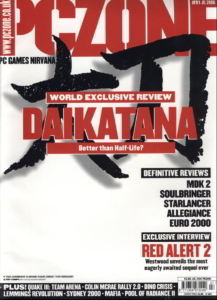
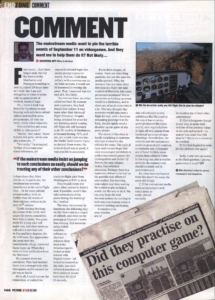
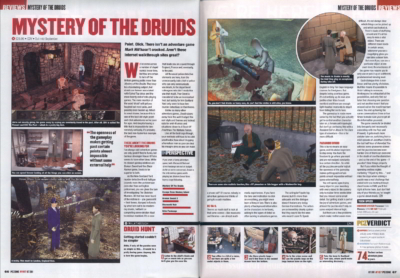
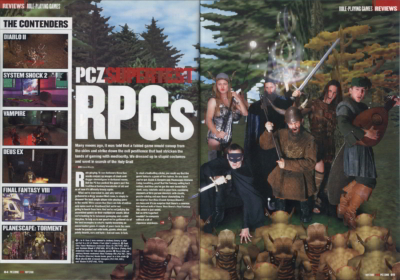
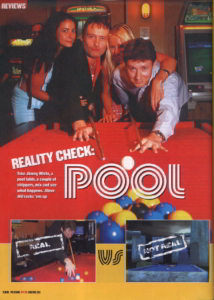
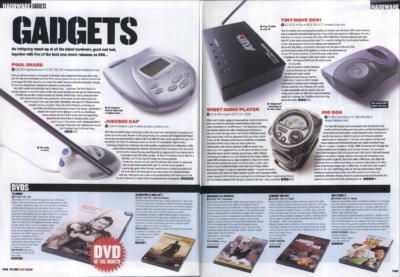


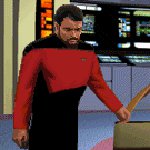
 Posts
Posts
PC Zone was a great read
January 26, 2022 @ 1:52 pm
These articles are great. As a fairly regular ’97 to 200ish reader its jogging a lot of memories. Didn’t PC Zone have some sort of spat with Dave Perry in the letters section after giving one of his games a drubbing… think it was Sacrifice? I never played it so I’m not sure who was in the wrong.
September 12, 2022 @ 6:25 am
I don’t remember anything in the letters (although I could well be wrong) – but on the final page of Issue 100, where birthday wishes from ‘the industry’ were published, Perry chose to mention (with tongue slightly in cheek, I think) Zone’s 62% score for Sacrifice. “I am SO unhappy with PC Zone right now!” – or words to that effect.
September 12, 2022 @ 11:17 am